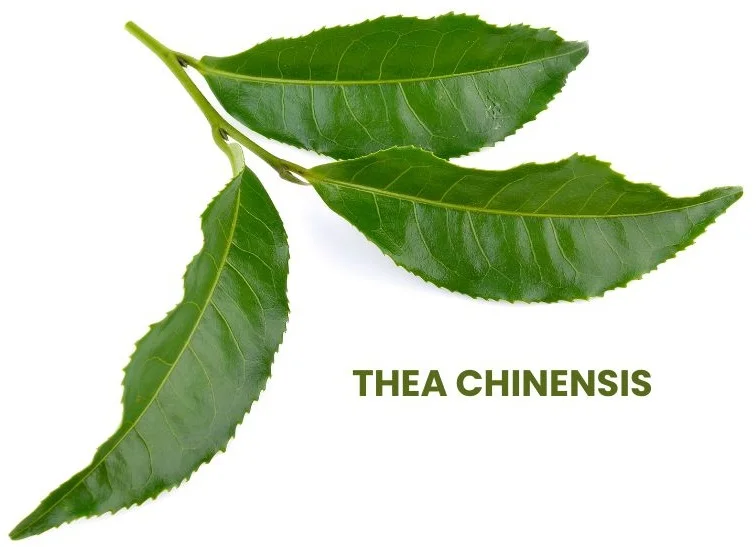Thea Chinensis, commonly known as Tea, is a homeopathic remedy derived from the leaves of the Camellia sinensis plant.
It is primarily used to address conditions related to nervousness, sleeplessness, heart troubles, and digestive issues, particularly those experienced by habitual tea drinkers.
It is known for its ability to counteract some of the adverse effects associated with excessive tea consumption.

Table of Contents
ToggleSOURCE INFORMATION
Scientific Classification
- Kingdom: Plantae
- Order: Ericales
- Family: Theaceae
- Genus: Camellia
- Species: C. sinensis
Origin and Historical Facts
- The tea plant, Camellia sinensis, is native to East Asia and has been used for centuries for its stimulant effects and as a traditional remedy.
- The practice of brewing tea dates back to ancient China, around 2737 BCE, according to legend.
- Homeopathic use of Thea Chinensis leverages its therapeutic properties, specifically addressing conditions exacerbated by tea consumption.
- It is used in homeopathy to treat symptoms such as nervous sleeplessness, heart palpitations, and digestive disturbances, mirroring the effects of excessive tea drinking.
DRUG PATHOGENESIS
- Thea Chinensis affects various bodily systems, producing symptoms that often resemble those seen in individuals who consume large amounts of tea.
- These include nervous system disturbances, heart issues, digestive problems, and sleep disturbances.
- The remedy is known for its impact on mental states, including irritability and hallucinations, as well as its physical effects on the stomach and heart.
PHYSICAL CONSTITUTION, DIATHESIS, AND TEMPERAMENTS
- Physical Constitution: Suitable for individuals experiencing symptoms related to excessive tea consumption, such as nervousness, digestive issues, and heart palpitations.
- Diathesis: Effective for people prone to dyspepsia and heart troubles, particularly those with a history of high tea consumption.
- Temperament: Often used for individuals who are restless, irritable, and experiencing disturbed sleep.
KEY CHARACTERISTICS
- Nervous Sleeplessness: Difficulty falling asleep and staying asleep, often accompanied by restlessness and a cold, damp feeling at the back of the head.
- Heart Symptoms: Anxious oppression, palpitation, and irregular pulse, particularly when lying on the left side.
- Digestive Issues: Sinking sensation in the stomach, craving acids, and sudden production of wind.
- Mental State: Temporary mental exaltation, irritability, and hallucinations of hearing.
DETAILED ORGAN SYMPTOMS
HEAD
- Mental Exaltation: Sudden, intense mental energy that may lead to irritability.
- Headache: Sick headaches radiating from a specific point, often accompanied by sleeplessness and restlessness.
- Cold Damp Feeling: Sensation of cold dampness at the back of the head.
STOMACH
- Sinking Sensation: A faint, gone feeling in the epigastric region, similar to that seen in other remedies like Sepia or Oleander.
- Cravings: Strong desire for acidic foods or drinks.
- Wind Production: Sudden onset of excessive gas in the stomach.
ABDOMEN
- Borborygmi: Rumbling noises in the abdomen, with a tendency toward hernia formation.
FEMALE
- Ovarian Symptoms: Soreness and tenderness in the ovaries.
HEART
- Palpitations: Rapid, irregular heartbeat with a sensation of fluttering.
- Anxious Oppression: Feeling of tightness and anxiety in the chest.
- Precordial Distress: Discomfort or pain in the region of the heart.
SLEEP
- Daytime Sleepiness: Feeling excessively sleepy during the day.
- Restlessness: Vascular excitement and restlessness at night, leading to disturbed sleep.
MODALITIES
- Worse: At night, while walking in the open air, and after meals.
- Better: From warmth and warm baths.
WHAT ARE MODALITIES IN HOMOEOPATHY?
RELATIONSHIP WITH OTHER DRUGS
Antidotes,
- Kali Hypophosphoricum: For the adverse effects of tea on the body.
- Thuja: Another antidote for tea-related symptoms.
- Ferrum: For fatigue and weakness related to tea consumption.
- Kali Hydriodicum: Used for tea-taster’s cough.
Compare with,
- Tabacum: For similar sick headaches and nausea.
- Sepia: For sinking sensation in the stomach and faintness.
DOSE
- General Use: Third to thirtieth potency.
- For Specific Conditions: Theine (1/4-1/2 grain) hypodermically for sciatica and supra-orbital neuralgia.
Frequently Asked Questions
What is Thea Chinensis used for in homeopathy?
- It is used to treat nervous sleeplessness, heart troubles, palpitation, dyspepsia, and symptoms related to excessive tea consumption.
Can Thea Chinensis help with digestive issues?
- Yes, it is used for symptoms like sinking sensation in the stomach, excessive gas, and craving for acidic foods.
How does Thea Chinensis affect sleep?
- It can cause restlessness and daytime sleepiness, along with disturbed sleep due to vascular excitement.
What is the recommended dose for Thea Chinensis?
- The remedy can be administered in potencies ranging from the third to the thirtieth.
- For specific conditions, Theine can be used hypodermically.
Is Thea Chinensis safe for long-term use?
- When used appropriately and under guidance, it is safe.
- However, like all homeopathic remedies, it should be used according to individual symptoms and potencies.
Glossary of Difficult Words
- Dyspepsia: Indigestion or discomfort in the upper abdomen.
- Epigastrium: The upper central region of the abdomen.
- Borborygmi: Rumbling noises produced by the movement of gas in the intestines.
- Precordial: Relating to the area in front of the heart.
- Sciatica: Pain that radiates along the path of the sciatic nerve, from the lower back through the hips and buttocks and down each leg.
- Supra-orbital: Pertaining to the area above the eye socket.

For despite using various medicines under homeopathy physician ie coffea crude,
ignitia, passiflora etc and thea 30 although
give no result but not shows any aggravation as faces long use of passiflora, ignatia etc . I want to try thea 200ch since i am cardic viscular disease
patient, along having ibs and gastric and fissure rheumatic problem and deprived
of sleep since childhood.
s